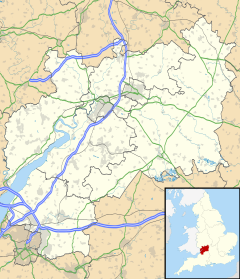Rodmarton
| Rodmarton | |
|---|---|
 Church of St Matthew, Rodmarton |
|
| Rodmarton shown within Gloucestershire | |
| Population | 333 |
| OS grid reference | ST941979 |
| • London | 85 mi (137 km)East |
| Civil parish |
|
| District | |
| Shire county | |
| Region | |
| Country | England |
| Sovereign state | United Kingdom |
| Post town | Cirencester |
| Postcode district | GL7 |
| Dialling code | 01285 |
| Police | Gloucestershire |
| Fire | Gloucestershire |
| Ambulance | South Western |
| EU Parliament | South West England |
| UK Parliament | |
Rodmarton is a village and civil parish in Gloucestershire.
Evidence of a Roman settlement has been found at Rodmarton. Through the parish runs a Roman trackway from Cirencester and Chavenage Green, adjacent to which is a long barrow.Roman roads such as the Fosse Way, Portway and the London Way run through or intersect near the parish. In 1636, a number of Roman coins and a tessellated pavement were discovered in the parish.
By the Domesday Survey in the late 11th century, the parish consisted of three tithings – Rodmarton, Culkerton, and Tarlton.
The nearby hamlet of Tarlton was home to the Arts and Crafts architect and designer Alfred Powell and his wife Louise from the 1920s to 1960. They built themselves a summer home and pottery studio where they designed pottery for Wedgwood and trained local workers in pottery painting.
Rodmarton is situated approximately 4 miles (6.4 km) north-east of Tetbury and 6 miles (9.7 km) west of Cirencester, and is close to Gloucestershire's border with Wiltshire. The village's proximity to Wiltshire appears to give origin to part of the parish's name, as the Old English maer means "boundary".
The parish lies primarily on the Forest Marble Formation. The soil in the area ranges from a light loam to stony brash, and the quality of the bedrock led to a number of quarries being established in the area.
...
Wikipedia

